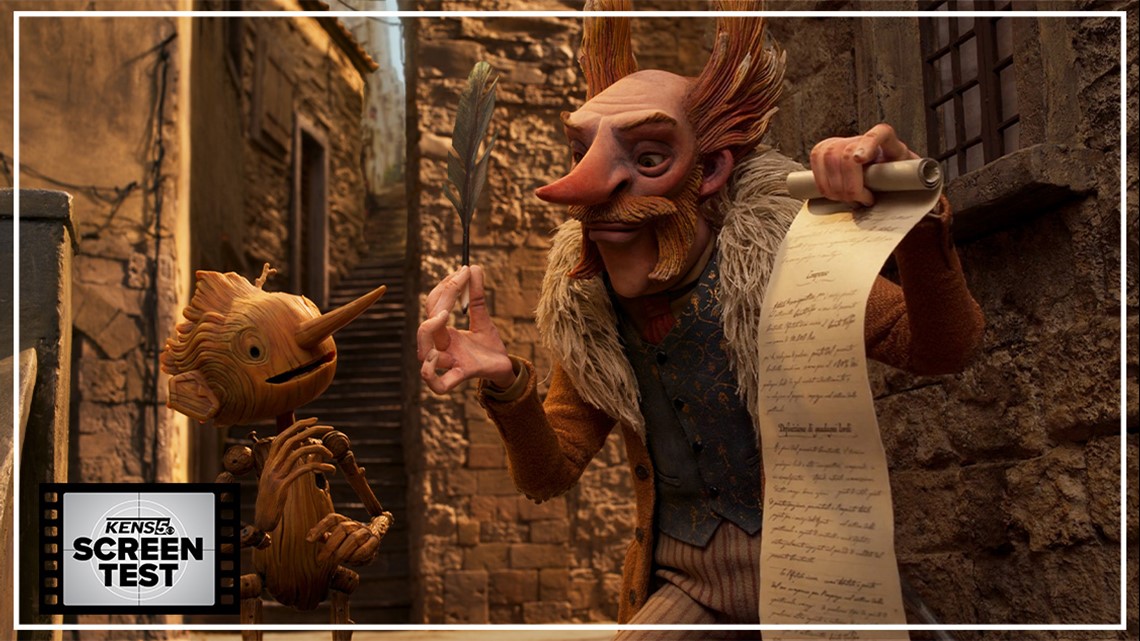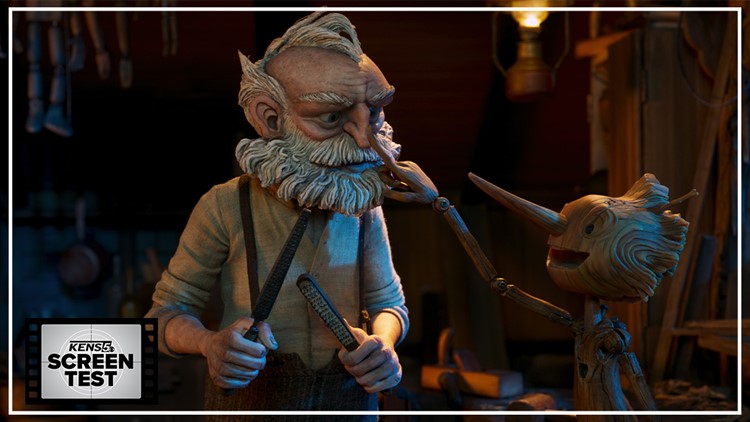SAN ANTONIO — We might have wondered, once upon a time, what Guillermo del Toro’s foray into younger-leaning storytelling would look like. Given his fascinations with the dark, decadent and darkly decadent, adapting a Grimm brothers fairy tale wouldn’t have been a bad guess; if there’s one thing those 18th-century storytellers and del Toro have in common, it’s the belief that our imagination might lend itself better to tales of horrific comeuppance than of cleanly polished morals.
But the very name of the brothers Grimm brings with it a brand that reverberates still two centuries later, and del Toro has always been one to champion the forgotten. So it goes that the Mexican filmmaker's first animated feature in the director’s chair is an adaptation of “Pinocchio,” but not the yellow-capped ragamuffin of the 1940 Disney movie (and certainly not his ill-conceived cousin, released just a few months ago). Instead it’s the original story by another 18th-century writer, Carlo Collodi of Italy, upon which del Toro’s stop-motion-animated “Pinocchio” lays its seeds—growing from it a ravishing cinematic showcase of one of our most passionate filmmakers digging into a tale about the different places that passion comes from.
For this movie’s version of Geppetto – the saintly old carpenter who eventually creates Pinocchio – that place is one of grief. The first boy we meet here isn’t made of wood but of flesh and bone; he’s Carlo, an supremely sweet-natured lad to whom Geppetto (voiced by David Bradley) teaches the ways of the world, from the cyclical ways of life to why fighter planes soar ominously overhead, either away from or toward war. In the process we receive an education in what it looks like when a master craftsman devotes himself to a kind of filmmaking that demands masterly craft. The film’s painstakingly decorated environments shimmer with an intense liveliness CGI can only dream of achieving, and when Carlo perishes from a stray bomb it’s staged with such turmoil the tangible sets only serve to amplify.
No, this isn’t your father’s “Pinocchio,” but rather a “Pinocchio” that foregrounds the bonds between fathers and sons, tightening them with tragedy. That Geppetto finally builds our hero amid a drunken stupor on a thunderous night underscores an unsurprising but no less potent truth about del Toro’s take on the material: This is a darker, more volatile “Pinocchio.”
Yet it explores that volatility with a largely graceful touch, even blurring the lines between chaos and joy. When life is breathed into Pinocchio (voiced with bouncy enthusiasm by Gregory Mann), he’s introduced as a fickle chap, gleefully destroying Geppetto’s house while injecting a newborn’s curiosity with sing-songy energy. (Among everything else, this “Pinocchio” is also a musical, the numbers adding aural dimension more than narrative complexity.) Rarely has a big-screen iteration of everyone’s favorite marionette felt like he had so much agency, and so much to learn about how the world around him operates.
That that world is contending with a rising fascist state means we’re a long way away from Disney’s sanitized films, but that isn’t to say parents should be worried about putting their kids to bed before booting the movie up on Netflix, where it will land Dec. 9. There’s plenty of light amid the darkness, not the dimmest of which is a stupendously cheery voice performance by Ewan McGregor as Sebastian J. Cricket. Returning to narrate Pinocchio’s journey (and occasionally to spell out the themes for younger audiences), Cricket delights as a wise voice of reason who is also eternally at risk of being smooshed by a falling book.


The other major change: This Pinocchio doesn’t yearn to be real. Rather, he revels in the ostensible freedoms of eternal life, returning again and again to an underworld region that sees del Toro imagining the afterlife as a glorified broom closet for lost souls. It’s here where the director indulges most explicitly in his obsessions with mortality, innocence, purpose—and also where our pinewood pal learns a thing or two about how to use the time we spend on Earth, and how some are more interested in how they use others.
But these sojourns, which also introduce us to an ornately designed cousin figure of the familiar Blue Fairy, stall the movie’s narrative progression as much as they bolden del Toro’s thematic standing. The filmmaker may never make a movie as rich and beguiling as “Pan’s Labyrinth,” but in striving for that caliber of storytelling he and cowriter Patrick McHale too often carve out their themes in the foundation of a wonderfully realized world, rather than letting them bloom organically. It’s part of the reason that we sense the story cutting corners when Pinocchio finds himself at a hellish military youth camp, to the point that tangential figures don’t leave a lasting impression beyond the ideology of what they stand for. Then again, perhaps the point is that they’re so driven by their ideology that any humanity has been erased.
Still, after the tech-forward, schematically organized worlds of “The Shape of Water” and “Nightmare Alley,” “Pinocchio” finds del Toro treading closer to the fable-like textures and storytelling daredevilry of “Pan’s Labyrinth” than he’s been in years. It’s no mistake that in a film whose triumphs can be found in the details of its production, it’s the periphery aspects of the Pinocchio tale as most of us know it that rise to the fore in del Toro’s telling. In the crevices and corners of Collodi’s source material the director locates sadness, grace and magic—restoring the classic's power and granting it intention anew.
"Pinocchio" is rated PG for dark thematic material, violence, peril, some rude humor and brief smoking. Now on Netflix. Runtime: 1 hour, 57 minutes.
Starring: Gregory Mann, David Bradley, Ewan McGregor, Ron Perlman
Directed by Guillermo del Toro and Mark Gustafson; written by del Toro and Patrick McHale
2022
---
MORE REVIEWS:



